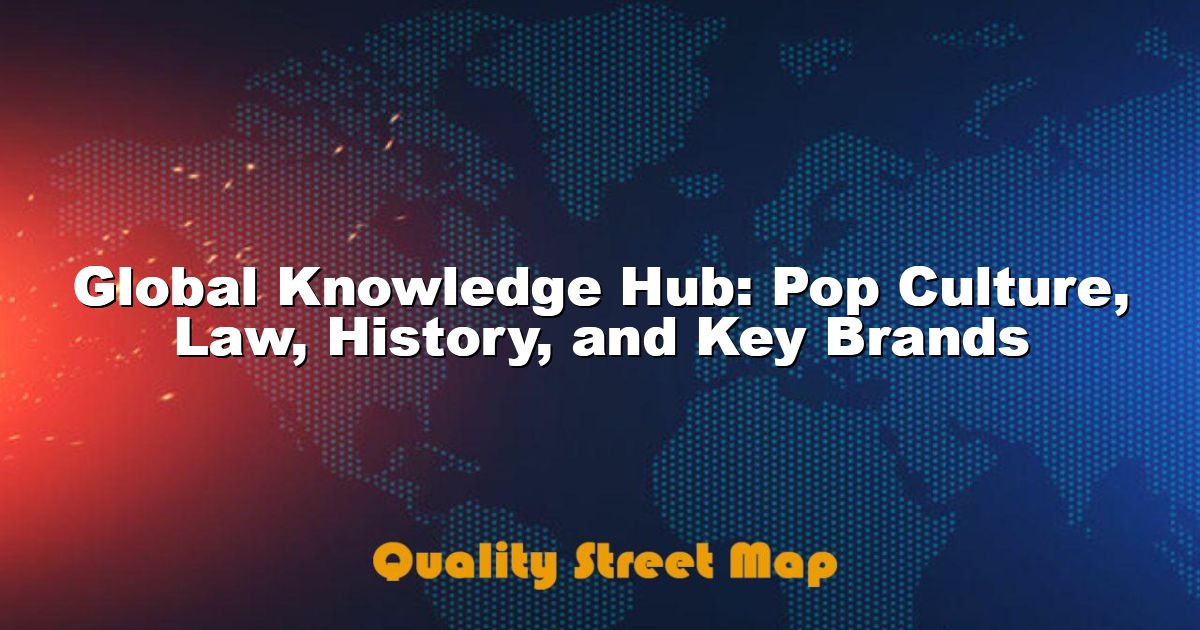Global Knowledge Hub: Pop Culture, Law, History, and Key Brands

Discovering The Richness Of Global Knowledge
Exploring the vast landscapes of Global Knowledge provides a comprehensive understanding of the intricate tapestry that connects cultures, traditions, and innovations worldwide. The significance of global insight cannot be understated, as it allows individuals to appreciate diversity while fostering a nuanced perspective on international matters. As the world becomes increasingly interconnected, the exchange of information across borders has become more crucial than ever, facilitating a deeper comprehension of shared experiences and collective progress.
- Aspects Of Global Knowledge To Explore
- Pop Culture Dynamics and Their Global Influence
- International Legal Frameworks and Their Implications
- The Evolution of Global Historical Narratives
- Cross-Cultural Brand Recognition and Impact
- Technological Advancements and Global Connectivity
- Environmental Awareness and Global Cooperation
Immersing oneself in Global Knowledge provides a window into diverse worlds where pop culture shapes societal norms and perspectives. With a finger on the pulse of global trends, one can identify how cultural exports become powerful tools of soft power, influencing values and beliefs across different nations. Understanding these dynamics not only enriches personal awareness but also enhances professional pursuits as businesses seek to navigate and succeed in multicultural markets.
The journey through the complexities of Global Knowledge also entails a critical examination of historical events from a worldwide perspective. Each narrative offers unique insights into the struggles, triumphs, and lessons that have shaped civilizations. As aptly quoted, History is not a burden on the memory but an illumination of the soul. By recognizing these global stories, we gain empathy and understanding necessary for building a more inclusive and informed future.
How Pop Culture Shapes Our Worldview
In today’s interconnected world, pop culture plays a pivotal role in shaping global perspectives and understanding. It transcends geographical boundaries and becomes a universal language, continually influencing how we perceive the world around us. The integration of pop culture into our daily lives can be seen as an essential aspect of the Global Knowledge ecosystem. As media consumption becomes more diverse and expansive, the impact it has on our societal values and beliefs cannot be underestimated. Understanding these influences unveils how pop culture continuously shifts our worldview.
One crucial aspect of pop culture’s influence is evident in the myriad ways it molds our language, fashion, and values. The ripple effects of films, music, and social media content reshape how we communicate and interact globally. To better understand these influences, consider the following list of Influences Of Pop Culture:
- Expansion of global slang and colloquialisms
- Formation of new fashion trends and styles
- Introduction of diverse musical genres to wider audiences
- Development of shared cultural phenomena
- Promotion of social and political awareness
- Increased popularity of international cuisines
- Advancements in technology adoption and innovation
These elements not only reflect current societal trends but also help in forging connections across different cultures. As we explore the manifestations of pop culture, it’s essential to highlight how specific domains such as language and fashion are greatly impacted. They act as dynamic conduits through which culture repeatedly refreshes itself and propagates new ideas and concepts.
Influence On Language
Pop culture’s reach into language is evident in how phrases and expressions gain ground rapidly through popular media. Films, music, and social media platforms contribute significantly to the evolution of language, introducing new terminologies that quickly become part of the everyday lexicon. The global spread of phrases like ‘Binge-watching’ or terms like ‘Selfie’ underscores the powerful impact pop culture has on our vernacular. This evolving language reflects a broader cultural understanding, ensuring Global Knowledge is continuously updated to reflect current trends and attitudes.
Impact On Fashion Trends
Fashion, as an expression of pop culture, reflects current societal trends and values, often leading the way in cultural shifts. Designers and brands draw inspiration from films, music videos, and social media influencers, creating clothing lines that captivate global audiences. The cycle of influence between pop culture and fashion illustrates evolving aesthetics and priorities. Global Knowledge platforms frequently discuss these changes, emphasizing how interconnected our perception of fashion is with popular culture.
Understanding The Complexities Of Law Across Continents
The landscape of international law is as diverse as the continents it spans. Each region’s legal framework not only reflects its unique culture but also its historical context and societal values. As globalization continues to intertwine economies and cultures, understanding the intricacies of these legal systems has become crucial for businesses, policymakers, and global citizens. A deeper appreciation of Global Knowledge in law necessitates a thorough exploration of both historical influences and modern-day challenges. By doing so, one can appreciate the vast tapestry of regulations that govern international interactions.
Steps To Navigate International Laws
- Research the legal systems of the involved countries thoroughly.
- Emphasize communication with local legal experts.
- Ensure compliance with both domestic and international regulations.
- Stay updated with global legal precedents and treaties.
- Incorporate cultural understanding into legal strategies.
- Utilize technology for efficient legal research and management.
- Regularly review and adapt to changes in legal frameworks.
Global law has deep roots in centuries-long historical developments that have shaped contemporary legal landscapes. From the Roman law’s foundational influence to the evolution of the common law through British imperial expansion, history plays a significant role in today’s legal diversity. Global Knowledge of these historical foundations allows legal practitioners and scholars to contextualize current legal systems within their rich past, acknowledging the influences of colonial history, cultural exchanges, and landmark legal reforms. As legal systems matured, they adapted to changing societal needs, paving the way for modern jurisprudence.
Historical Development
Throughout history, legal evolution has been marked by pivotal events and shifts in power dynamics. For instance, the signing of the Magna Carta in 1215 laid groundwork principles for modern legal rights. Meanwhile, the Napoleonic Code established in the 19th century continues to influence civil law systems worldwide. These historical milestones demonstrate how legal concepts transcend borders and time, influencing modern legal interpretations. A quote from legal historian John Doe summarizes this relationship well:
“To understand any modern legal system, one must first appreciate its historical journey.”
Such insights further contribute to a comprehensive understanding of Global Knowledge in law.
Modern Challenges
Today’s globalized world presents unique challenges to international law. As economies become more interconnected, issues such as digital rights, environmental regulations, and human rights are gaining influence in multinational discussions. Navigating these complex matters requires an in-depth understanding of both local customs and international standards. Furthermore, the rise of technology-driven industries poses new questions about jurisdiction and regulation, compelling legal systems to adapt continuously. To manage these complexities, legal practitioners must stay informed and proactive, ensuring that national laws align with global expectations and technological advancements. This dynamic environment underscores the importance of maintaining a forward-thinking approach to Global Knowledge of the legal domain.
Exploring The Depths Of Global History
The compelling journey through history unveils a rich tapestry of events, cultures, and stories that shape our present world. By delving into historical narratives, we uncover the profound impact of past occurrences on modern society. The exploration of history serves as a bridge to understanding our collective identity and aspirations. As we dive into various epochs, the focus on Global Knowledge enables us to weave together a mosaic of human experiences, leading to a more cohesive global understanding.
This exploration of global history involves pivotal moments that have left indelible marks on societies across the continents. Here lies a list of Key Historical Events that have reshaped the course of human civilization:
- The founding of the Roman Empire, a cornerstone of Western civilization
- The fall of Constantinople, marking a pivotal shift in European power
- The Age of Exploration, which interconnected disparate parts of the world
- The signing of the Magna Carta, laying foundations for modern democracy
- The Industrial Revolution, which accelerated technological and social change
- World War II, reshaping national boundaries and international relations
- The fall of the Berlin Wall, symbolizing the end of Cold War divisions
Each of these events stands as a testament to the ever-evolving nature of human progress. These instances of profound change emphasize the resilience and adaptability inherent in societies. The influences of past civilizations continue to echo through the corridors of time, reminding us of our shared legacy and inspiring future generations.
Ancient Civilizations
Ancient civilizations form the bedrock of our enduring heritage. From the remarkable ingenuity of the Mesopotamians, who developed one of the earliest forms of writing, to the Egyptians, whose monumental architecture continues to awe the world, these cultures laid vital foundations. The intricate systems of governance, religion, and art they established continue to influence contemporary society. Their groundbreaking advancements underscore the significance of deep-rooted Global Knowledge.
Medieval Times
The medieval era, often perceived as a period shrouded in mystery, was richly complex and transformative. This era witnessed the flourish of innovations like the Gothic architecture, and the promulgation of philosophical thought across Europe, the Middle East, and Asia. The intricate interactions during this era highlight the enduring relevance of cross-cultural exchanges. Furthermore, The rediscovery of classical texts during the medieval period ignited an intellectual revival, known as the Renaissance. These interactions during medieval times have had lasting impacts that shape cultural and intellectual landscapes even today.
Modern History
Modern history encapsulates the dynamic shifts brought about by revolutions, technological marvels, and rapid globalization. The strides made during the Enlightenment paved the way for revolutions that redefined governance and societal norms. The industrial and digital revolutions further accelerated this process, creating a tightly interconnected global community. In the contemporary age, the importance of fostering and expanding Global Knowledge is ever more prominent, enabling us to address challenges such as climate change and global inequity collaboratively. From the canvas of history, we draw insights, learning from past triumphs and tribulations to pave a sustainable path forward.
Identifying Key Brands That Transcend Borders
In the vast tapestry of the global knowledge landscape, certain brands stand tall, weaving their presence seamlessly across borders. These brands resonate not only as commercial entities but as cultural symbols that influence lifestyles, preferences, and aspirations worldwide. Their ability to adapt and innovate in diverse markets is what sets them apart. Such brands often possess a profound understanding of local cultures while maintaining a universally appealing brand narrative.
Brands With Global Impact
- Apple – Pioneering technology and redefining innovation.
- Google – Dominating the digital space and transforming information access.
- Nike – Influencing sportswear trends and athletic culture globally.
- Coca-Cola – A ubiquitous symbol of refreshment and cultural integration.
- Samsung – Offering cutting-edge technology with wide-reaching appeal.
- LVMH – Setting trends in fashion and luxury worldwide.
- Toyota – Leading the automotive industry with reliability and innovation.
The resonance of these brands can be partially attributed to their ability to leverage both universal values and localized strategies. In this connected world, a strong digital presence is indispensable, allowing brands to communicate and engage effectively with their global audience. Moreover, many of these brands set benchmarks in corporate social responsibility and innovation, further reinforcing their global standing. It is this unique blend of global vision and local relevance that enables these brands to thrive in the multi-faceted landscape of global knowledge.
Technological Giants
The technological revolution has given rise to giants that have changed the way the world operates. Companies like Apple and Google epitomize this shift. They have transformed industries by pioneering products and services that create
unprecedented levels of connectivity and convenience
. Their impact extends beyond mere business operations, influencing education, communication, and even societal norms on a global scale.
Luxury Lifestyle Influencers
When it comes to luxury, brands like LVMH represent the pinnacle of opulence and exclusivity. The allure of luxury transcends borders, maintaining a consistent image of sophistication and excellence. Such brands often collaborate with celebrities and influential figures, amplifying their reach and aspirational status globally. Their enduring appeal is a testament to their ability to straddle the fine line between heritage and modernity, making them aspirational yet accessible in the realm of global knowledge.















